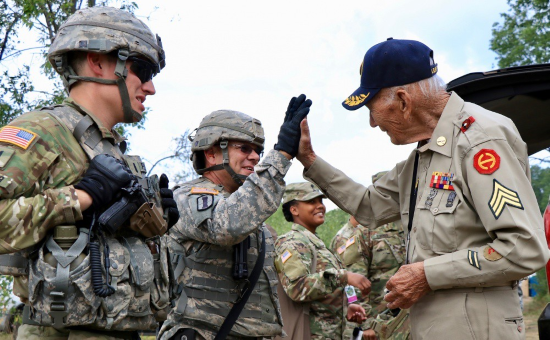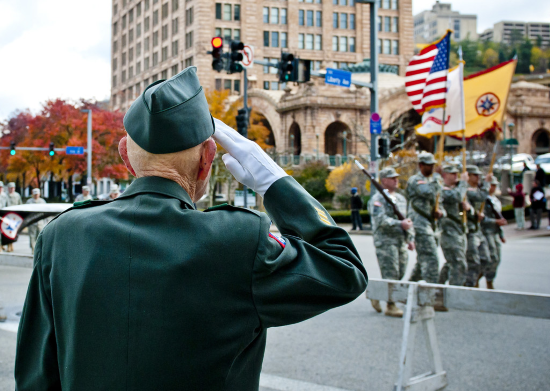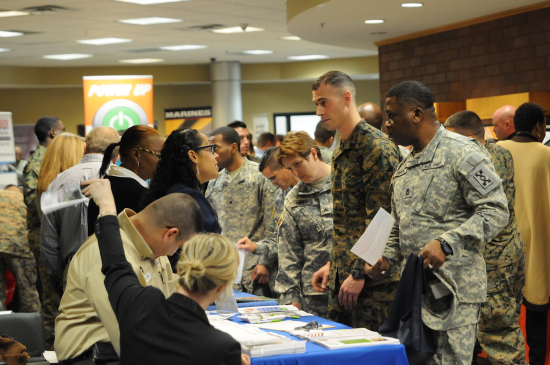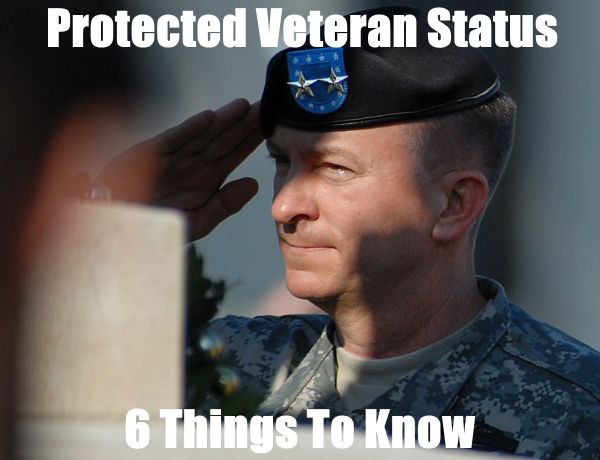When you complete an application it’s not uncommon to find the term “protected veteran”.
Protected veteran is a type of status that protects qualifying veterans from discrimination, including in the workplace.
Consequently, you could define protect veteran status as a type of affirmative action for military personnel.
Protected veteran status was initiated as part of the Vietnam Era Veterans’ Readjustment Assistance Act.
Learn more about the meaning of protected veteran and other practical information, below.
Related Article – Stop-Loss Military Meaning: 8 Things To Know
Table of Contents
#1. Protected Veteran Meaning

What does it mean to be a “protected veteran”?
You’ll often encounter this question on an application for a job or mortgage.
The status is part of an initiative that was created by the government as part of the Vietnam Era Veterans’ Readjustment Assistance Act (VEVRAA).
As a result, protected veteran status protects qualifying veterans from discrimination, particularly in the workplace.
There are 4 types of protected veteran status (more information, below) that outline regulations which prevent discrimination.
For this reason, VEVRAA applies to any company that does business with the federal government.
Moreover, this regulation applies to any contractor or subcontractor that does business with the government.
Even better, veterans receive more safeguards under The Uniformed Services Employment and Reemployment Rights Act (USERRA).
USERRA is also designed to prevent employment discrimination based on military service.
Furthermore, the act guarantees reasonable accommodations for veterans with disabilities.
Lastly, USERRA is intended to prevent National Guard and Reservists from losing their civilian employment and benefits while serving the country.
#2. Types of Protected Veterans
It’s important to understand that there are 4 main types of protected veterans.
The Vietnam Era Veterans’ Readjustment Assistance Act (VEVRAA) designates the class based on the status and outlines of certain regulations.
Consequently, each group presents employers with a series of conditions they must meet.
However, protected veteran status is only available to qualifying service members that were honorably discharged.
The 4 types of protected veterans are:
- Disabled Veterans
- Recently Separated Veterans
- Armed Forces Service Medal Veterans
- Active-Duty Wartime or Campaign Badge Veterans
In general, “Disabled Veterans” qualify if a service-related disability caused you to get discharged or released from active duty.
Thus, disabled veterans receive compensation based on the laws set forth by the Secretary of Veteran Affairs.
Meanwhile, “Recently separated veterans” is a status reserved for personnel that have recently been discharged or released from active-duty.
In order to qualify, you must have been released or discharged in the last 3 years.
Third, recipients of the Armed Forces Service Medal also qualify as protected veterans.
Armed Forces Service Medals are awarded to active-duty service members under the Executive Order 12985.
Lastly, protected veteran status is granted to recipients of campaign badges and certain conflicts.
In general, campaign badges are authorized for certain wars and campaigns by the Department of Defense (DoD).
Thus, you may qualify if you were on active duty during one of these conflicts.
Related Article – Types Of Military Discharge
#3. Employer Responsibilities
Let’s face it, some employers are hesitant to hire veterans.
Why?
There are unfortunate stereotypes that exist such as vets being rigid or hostile.
Then, there is the concern about PTSD and other mental health disorders.
Nevertheless, it’s crucial that employers understand their responsibilities under the Vietnam Era Veterans’ Readjustment Assistance Act (VEVRAA).
If not, the employer is violating applicable laws and needs to get held accountable.
It’s illegal to get discriminated against because you are a military veteran.
Thus, laws like VEVRAA and USERRA are specifically designed to prevent discrimination in the workplace.
These protections begin at recruiting and hiring and continue during your employment with a company or contractor.
Furthermore, employers must continue to promote upward mobility for employers that are protected veterans.
Protected veteran status is applied like other types of affirmative action to ensure workplace diversity and tolerance.
Any veteran that believes they are being discriminated against in the workplace should file an official complaint.
Companies and contractors may lose their contracts with the federal government when found in violation of VEVRAA.
#4. List of Veteran Protections
You have rights as a protected veteran that prevent you from being stereotyped or discriminated against at work.
Often, veterans are categorized as being difficult to hire whether because of false notions or the assertion that every solider has PTSD.
Unfortunately, these stereotypes handicap veterans and prevent them from being treated fairly and as equals in the civilian world.
Whether intentional or not, protected veteran status prevents you from being taken advantage of by an employer and/or coworkers.
Furthermore, being a protected veteran assists you with finding quality employment.
It grants you protections throughout the course of the hiring process (from recruitment to the interview).
Consequently, an employer cannot use the military service or veteran status as a basic for employment decisions.
Furthermore, an employer cannot discriminate against Reserve and National Guard members that need time away to serve the country.
Additionally, being a protected veteran also serves you well after being hired since it establishes safeguards in the workplace, too.
Thus, being a protected veteran is not reason for:
- Denial of Employment
- Lower Pay
- Harassment
- Demotions
- Terminations
- Unfair Treatment
Moreover, an employer cannot refuse to provide reasonable accommodations listed under VEVRAA.
Reasonable accommodations may include scenarios like modifying the work schedule or workplace for a veteran.
While a protected veteran can still be laid off or terminated, it must be legal.
If not, you are facing a wrongful termination lawsuit and should file a complaint with the U.S. Department of Labor.
#5. Protecting Privacy

Veterans also have rights to privacy in regards to the Vietnam Era Veterans’ Readjustment Assistance Act.
For example, employers are allowed to inquire about military service.
In fact, it’s advised that you answer questions about military status to guarantee being a protected veteran.
The military service questions on an application provide valuable information for recruiting and hiring efforts.
Moreover, it grants certain protections like the employer not being able to pry about disabilities during the interview.
The law actually applies to anyone with a disability to prevent that type of workplace discrimination.
#6. Benefits of Hiring Vets

Since there are so many misconceptions about veterans it’s important to promote the benefits during job recruitment.
As a result, do not be afraid to highlight military achievements on a resume.
Moreover, during the job interview, make sure to point out what you learned from military service and how it will benefit you in the civilian world.
Often, employers simply misunderstand veterans which is why have an open and honest dialogue is important.
There are numerous advantages to hiring veterans, something you should address during the interview.
For example, nearly 30% of veterans agree that their service is “very useful” in providing relevant skills for civilian employment.
Additionally, military personnel are notorious for their discipline, punctuality, honor, and trustworthiness.
Veterans have often handled high pressure situations in the military and respond well to order and management hierarchy.
Furthermore, military personnel can follow instructions and generally place very high performance expectations to succeed.
Lastly, military service makes you more tolerant since you often work with others from different backgrounds.
Related Article – Best Army Jobs For Civilian Life
Conclusion
There are approximately 200,000 service members that leave the military each year.
The next question becomes what veterans can do to make a living.
Often, finding a job is the biggest transition back to civilian life for veterans.
As a result, you are granted safeguards established by being a protected veteran.
There are 4 types of protected veterans that are designed to prevent discrimination at the workplace.
For this reason, an employer cannot hire you simply because of your military status or prevent upwards mobility.
You are also protected from being judged, harassed, or treated unfairly because of your veteran status.
Protected veteran status is only authorized to individuals that are discharged from the military honorably.
- Ikon Pass Military Discount: Learn How To Save Big - January 31, 2025
- RTIC Military Discount: Find Out How To Save Big on Gear - January 30, 2025
- Traeger Military Discount: Learn How To Save Big on Smokers - January 28, 2025


